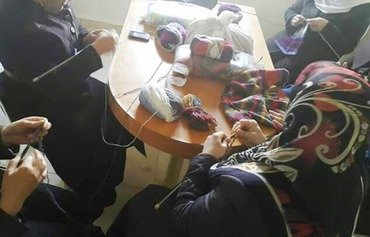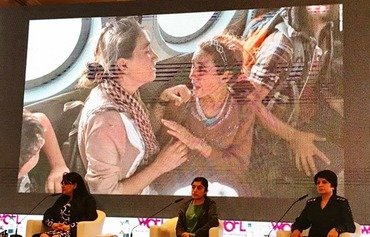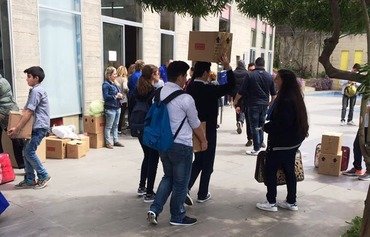Spurred to leave their villages by the approach of the liberating forces, dozens of families from the vicinity of the Syrian city of al-Raqa embarked on a long and arduous journey to escape the "Islamic State of Iraq and the Levant" (ISIL).
Most family groups, comprised mainly of women, children and the elderly, headed for Lebanon, where they found shelter in makeshift camps in Qab Elias and in the homes of relatives in Mount Lebanon.
Women who spoke with Al-Mashareq said they had no choice but to flee the villages of al-Ajajiyah in al-Jarniya district, about 100 kilometres from al-Raqa city, and al-Tarka near al-Tabqa, after living conditions became unbearable.
They paid hefty sums to join their husbands in Lebanon, they said, walking for long hours in mountainous terrain with smugglers whose identities they did not know and in fear of encountering ISIL elements along the way.
Among them were al-Tarka residents Zahia Mohammed, her 2-year-old daughter and her ailing mother-in-law, Fatima, who settled in the Lebanese town of Mazraat Yachouh where Mohammed's husband had found work as a carpenter.
"After ISIL entered al-Raqa and seized full control of all corners of the region, my husband was able to escape to Lebanon a year ago, so I stayed with my mother-in-law and my daughter," she told Al-Mashareq.
"We lived under the laws of ISIL, whose elements turned the school and police station into their headquarters," she said. "I rarely left the house so I did not get harassed or see the torture or killing of residents, as happened often."
The recent military mobilisation and stepped up airstrikes targeting ISIL positions in the area compelled the three "to make a serious effort to leave", she said.
Mohammed's husband "insisted that we leave", she said, but that was not an easy endeavor, as the family needed to ensure their safe arrival in Lebanon.
A dangerous journey
About 20 families assembled "and we left at night in the last week of October, embarking on a journey fraught with danger that started aboard a truck that took us towards the mountains", Mohammed said.
"After a short rest, we had to walk in the moonlight for hours, despite the fatigue that strained both young and old," she said.
The journey from al-Tarka to Damascus via al-Qamishli took four days, she said.
"We walked along mountain roads, keeping out of sight of ISIL. But as we were getting ready to traverse a mountain road, we were intercepted by five ISIL elements. The smuggler spoke with them, and they reacted by saying out loud, 'Go to the lands of debauchery', and they continued on their way," she said.
Four smugglers took turns escorting the group, Mohammed said.
"The last one got us to the closest point to al-Qamishli and told us to walk [the rest of the way] on our own," she added.
From al-Qamishli they flew to Damascus, she said, and from there travelled to al-Masnaa border crossing, where her husband was waiting for them.
"Today we live far from ISIL’s oppression and the woes it will soon bring upon the town," Mohammed said.
A rough mountain road
In mid-October, Aisha al-Jassim fled al-Ajajiyah in al-Raqa province's al-Jarniya district for Lebanon, accompanied by her three children and other relatives.
"The security situation in the region and ISIL’s encirclement of our village and clampdown on us compelled us to flee," she told Al-Mashareq. "My husband is in Lebanon, and my parents live in the town of Manbij. When the word spread that the liberation of al-Raqa was near, my husband insisted that we leave the town."
"The journey started from in front of our house in a taxi that took us to the city of al-Raqa," she said. "The driver told the elements manning the checkpoints we passed that we were coming to live in the city."
After paying the driver his fare, she said, a smuggler transported them to the Tishrin dam, where they joined dozens of other fleeing families.
The second leg of the journey involved climbing up a mountain on a rough road that was especially hard on her children, ages 3, 4 and 5, al-Jassim said.
After a three-day journey, they reached the outskirts of Damascus, and from there traveled to Lebanon through the Bekaa Valley, where her husband was waiting for them.
They then moved to a makeshift camp in Qab Elias, where they live in a tent.
Al-Jassim said living conditions in al-Ajajiyah "had become very difficult and we had to escape", adding that her family's perseverance had paid off.
Escape from ISIL
Zainab al-Jassim also arrived from al-Ajajiyah with her five children in the first week of November. She is a relative of Aisha al-Jassim and shares the same tent.
"It was necessary for us to leave," she told Al-Mashareq. "We chose Lebanon because my brother and his family are here and my husband is deceased. Many advised me to go to shelters close to the Turkish border where aid is available, but I opted for Lebanon, because I am looking for safety for my family."
"Our journey was fraught with danger," she said. "We hid many times so ISIL elements would not see us. We climbed mountains and slept two nights in the wilderness. We walked at night and rested during the day."
Upon her arrival in Damascus with her children, they boarded a taxi and entered Lebanon, settling in the Bekaa Valley camp.
All who spoke with Al-Mashareq said al-Raqa residents are living in fear of ISIL and avoid leaving their homes or villages. Supplies are running out, they said, and people live in fear of what ISIL will do as the noose is tightened around it.
Many residents are contemplating escape, they said, and many other families are living in the wilderness, out of sight of ISIL.

![This Syrian family from rural al-Raqa, pictured on November 25th, has found refuge in Mazraat Yachouh in Mount Lebanon. [Nohad Topalian/Al-Mashareq]](/cnmi_am/images/2016/11/30/6682-lebanon-raqa-families-600_384.jpg)






